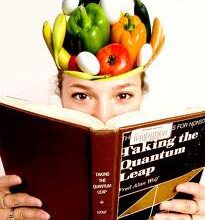Brain shrinkage can be avoided, and memory can be sharpened, simply by making some changes in your diet. Studies published in the medical journal of the American Academy of Neurology, and a recent online issue of Neurology, have shown diets play a significant part in maintaining good memory and mental health.
Study author Gene Bowman, ND, MPH, of Oregon Health & Science University in Portland and a member of the American Academy of Neurology, says that people with diets that are high in several essential vitamins and omega3 fatty acids are less likely to have memory loss and brain shrinkage associated with Alzheimer’s and other forms of dementia.
Vitamins C, D, E and all the B vitamins, as well as omega3 fatty acids have been found to elevate memory and received higher scores on mental and cognitive tests than people whose diets are low in these nutrients.
They have also found that those whose diets are high in trans fats are more likely to score lower on thinking and memory tests, and have a higher ratio for brain shrinkage, than those who consume lesser amounts of trans fats.
Trans fats are found primarily in packaged or frozen foods, fast food and fried foods, baked goods and margarine. Vitamin D and omega 3 fatty acids are found primarily in fish, and the B vitamins and antioxidants in vitamins C and E are found primarily in fruits and vegetables.
One the studies involved 104 people with an average age of 87, and indicated few risks of memory and cognitive problems. Blood tests were used to determine nutrient levels in the blood of each participant. Each of them also took memory and thinking skills tests. Forty-two of the participants were given MRI scans to measure the volume of their brains
Seven participants were deficient in Vitamins B12, 25% were low on Vitamin D, but overall the participants had good nutritional indicators.
“This study was the first to use nutrient biomarkers in the blood to analyze the effect of diet on memory and thinking skills and brain volume. Previous studies have looked at only one or a few nutrients at a time or have used questionnaires to assess people’s diet,” said Bowman. Most studies rely on participants’ memory as to their diet, and have not done blood tests to check the nutrient levels, and do not account for how much the body absorbs, especially in the elderly.
The conclusion was that the nutrient biomarkers in the blood accounted for a “significant amount of the variation in both brain volume and memory test scores. For the thinking and memory scores, the nutrient biomarkers accounted for 17 percent of the variation in the scores. Other factors such as age, number of years of education and high blood pressure accounted for 46 percent of the variation. For brain volume, the nutrient biomarkers accounted for 37 percent of the variation.
“These results need to be confirmed, but obviously it is very exciting to think that people could potentially stop their brains from shrinking and keep them sharp by adjusting their diet,” Bowman said.
About the author:
Ron White is a memory training expert. As a memory keynote speaker he travels the world to speak before large groups or small company seminars, demonstrating his memory skills and teaching others how to improve their memory, and how important a good memory is in all phases of your life.
Sources:
The Jerusalem Post — Diet patterns may keep brain from shrinking: http://www.jpost.com/Health/Article.aspx?id=251853&R=R77
The Jerusalem Post – Healthy Eating: Food for Thought: http://www.jpost.com/Health/Article.aspx?id=209034



